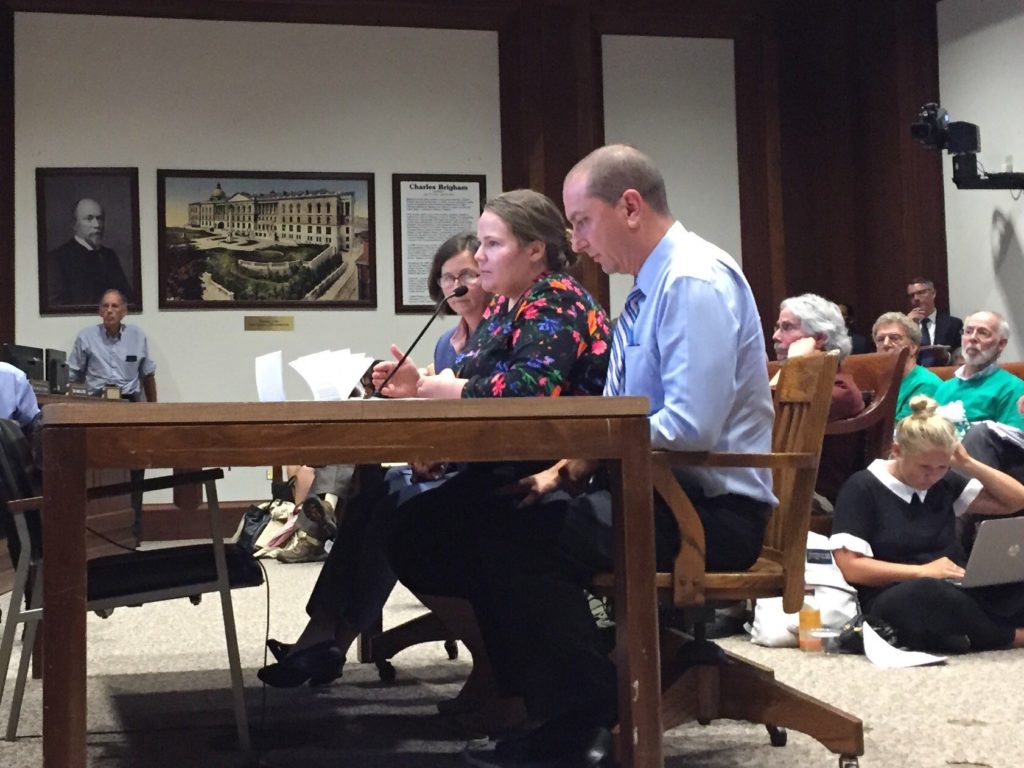
CLF attorney Caitlin Peale Sloan speaking to legislators about much-needed updates to our state's Renewable Portfolio Standard.
CLF is working with our partners to advance clean energy jobs for people in New England and to help make dirty fossil fuels a thing of the past. That’s what brought me to the State House recently, where I testified in favor of a strong renewable energy policy for Massachusetts.
Updating Our Clean Energy Directives
I – along with other environmental groups, local business owners, and a few fearless high school students – spoke about the need to update our state’s Renewable Portfolio Standard at a hearing held by the joint committee on telecommunications, utilities, and energy. This group of legislators is considering a number of bills that would help Massachusets benefit from renewable energy and meet our emissions-reduction goals.
The Renewable Portfolio Standard, or “RPS,” requires our electric companies (Eversource, National Grid, and Unitil) to make sure that a portion of the electricity they supply comes from renewable energy sources like wind and solar. Under our current laws, these companies are required to buy more and more renewable energy each year. But it’s a small amount – only 1 percent more per year. Working at that pace, even a decade from now less than 25 percent of the electricity Massachusetts needs to power its’ homes and businesses would come from clean, renewable sources.
This is not enough. We know that we aggressively need to move our electricity to low- and zero-carbon sources. That way, we can convert other fossil fuel guzzlers like cars and home heating to electricity without increasing climate-damaging emissions.
Good for the Economy, Good for the Planet
Both advocates and lawmakers came into this legislative session (January 2017–July 2018) knowing that we needed to increase the RPS. The debate has been by how much.
A report this spring from Synapse Energy Economics showed us the way: It found that increasing from that 1 percent per year to 3 percent per year would do the trick (doubling the amount of electricity from renewable sources to 50 percent by 2030). That number would incentivize the development of new renewables beyond what other policies would get us, add tens of thousands of clean energy jobs in New England, provide a hedge against volatile natural gas prices, and reduce greenhouse gas emissions. I testified in favor of this approach at the hearing.
Moving Massachusetts Forward
In my testimony, I also advocated for CLF’s proposed Global Warming Solutions Implementation Act. (While the main version of this bill already had a hearing, the bill’s language is included in a larger energy-related bill that was also being heard during the RPS hearing).
While we know thanks to Synapse’s analysis that increasing the RPS will have a much-needed positive impact up to 2030, it’s harder to analyze our options through 2050. Based on the Global Warming Solutions Act, we have to slash our emissions by 2050. The Global Warming Solutions Implementation Act directs Massachusetts to do that hard work.
While Massachusetts may be ahead of many states in the push for clean energy and the fight against climate change, we can’t rest on our laurels. We need to keep fighting for meaningful action to reduce climate-damaging emissions, like updating our Renewable Portfolio Standards and adopting the Global Warming Solutions Implementation Act.
[How you can help – sign up for email action alerts so you’ll know when you can make your voice heard in support of these critical bills.]



